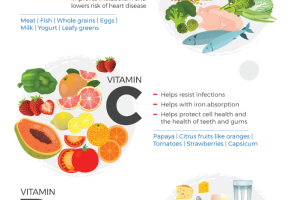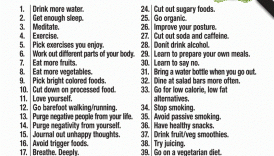Discover the Science behind Living Good Vitamins and Their Benefits

Introduction to Vitamins
What Are Vitamins?
Vitamins are organic compounds that are essential for the proper functioning of our bodies. They play crucial roles in metabolic processes, helping to convert food into energy and supporting various bodily functions. The fascinating part about vitamins is that they can’t be produced in sufficient amounts by our bodies, thus requiring us to obtain them through our diets. There are two main categories of vitamins: water-soluble and fat-soluble. Water-soluble vitamins, including Vitamin C and the B vitamins, dissolve in water and are not stored in the body for long periods. On the other hand, fat-soluble vitamins, such as Vitamins A, D, E, and K, are stored in our body fat and liver, making them accessible for use when needed. To illustrate the significance of vitamins, consider the oft-told story of a young man who was feeling fatigued and sluggish. After a routine check-up, he discovered he was lacking vitamins from his diet. With some simple dietary adjustments, including more fruits, vegetables, and whole grains, he felt revitalized in no time. It’s a reminder that the choices we make daily can affect our overall health.
- Discover the Science behind Living Good Vitamins and Their Benefits
- Introduction to Vitamins
- What Are Vitamins?
- Importance of Vitamins for Health
- Understanding Water-Soluble Vitamins
- Vitamin C: Benefits and Sources
- B Vitamins: Roles and Functions
- Exploring Fat-Soluble Vitamins
- Vitamin A: Vision and Immune Health
- Vitamin D: Bone Health and Immunity
- The Power of Antioxidant Vitamins
- Vitamin E: Antioxidant Properties
- Vitamin A: Fighting Free Radicals
- Unveiling the Benefits of Vitamin Supplementation
- Benefits of Multivitamins
- Vitamin D Supplements: Who Needs Them?
Importance of Vitamins for Health
The importance of vitamins cannot be overstated. They help regulate numerous physiological functions, support immune health, and play a role in preventing various diseases. Here are some key ways vitamins contribute to overall health:
- Energy Production: B vitamins, like B1, B2, and B3, are crucial for converting carbohydrates and fats into energy.
- Immune Support: Vitamins A, C, and D play significant roles in maintaining a healthy immune system—crucial for warding off illnesses.
- Bone Health: Vitamin D is essential for calcium absorption, which is vital for maintaining strong bones.
- Antioxidant Protection: Vitamins C and E act as antioxidants, protecting the body from oxidative stress and free radical damage.
Understanding the impact of vitamins helps emphasize the necessity of a balanced diet rich in these vital nutrients. A simple yet effective approach to achieving this can include incorporating a wide variety of colorful fruits and vegetables into meals as a way to ensure a steady intake of vitamins.
Understanding Water-Soluble Vitamins
Vitamin C: Benefits and Sources
Continuing our exploration of vitamins, let’s dive into the realm of water-soluble vitamins, starting with Vitamin C. This vibrant vitamin is not just a refreshing addition to your morning orange juice; it’s a powerhouse of benefits for your body. Vitamin C, also known as ascorbic acid, is known for its impressive immune-boosting capabilities. It helps the body produce collagen, a vital protein that supports skin, blood vessels, and connective tissues. Moreover, it acts as a potent antioxidant, helping to protect cells from the damage caused by free radicals. Some notable benefits of Vitamin C include:
- Enhanced Immune Function: A strong immune system can fend off common colds more effectively.
- Wound Healing: Vitamin C is crucial for repairing tissues and healing wounds.
- Improved Iron Absorption: It aids in the absorption of non-heme iron, which is essential for preventing anemia.
When it comes to sourcing Vitamin C, nature has got us covered. Fragrant citrus fruits like oranges and lemons, along with colorful bell peppers, kiwi, strawberries, and broccoli, pack a punch of this nutrient.
B Vitamins: Roles and Functions
Now, let’s turn our attention to the B vitamins, a group of vitamins that collectively play vital roles in our overall health. The B vitamins range from B1 (thiamine) to B12, each performing unique functions critical for maintaining our health. These vitamins are particularly known for their significant effects on energy production and metabolism. They help convert carbohydrates, fats, and proteins from food into usable energy. Here’s a closer look at some key B vitamins and their roles:
- Vitamin B1 (Thiamine): Supports nerve function and energy metabolism.
- Vitamin B2 (Riboflavin): Helps in energy production and skin health.
- Vitamin B3 (Niacin): Plays a critical role in creating cholesterol and fats, regulating blood sugar levels.
- Vitamin B6 (Pyridoxine): Essential for protein metabolism and cognitive development.
- Vitamin B12 (Cobalamin): Important for red blood cell formation and neurological function.
Incorporating a variety of foods into your diet is the most effective way to ensure adequate B vitamin intake. Foods like whole grains, legumes, seeds, nuts, eggs, and dairy products are excellent sources. A simple personal tip: when feeling low on energy, a hearty bowl of oatmeal topped with nuts and berries can be a great way to fuel up on these vital nutrients! Each bite not only tastes great but also provides a wealth of B vitamins essential for your body.
Exploring Fat-Soluble Vitamins
Vitamin A: Vision and Immune Health
Shifting gears to fat-soluble vitamins, let’s begin with Vitamin A, a nutrient that plays a vital role in maintaining overall health, particularly in relation to our eyesight and immune system. Vitamin A is crucial for the formation of rhodopsin, a pigment in the retina that enables us to see in low-light conditions. As someone who enjoys evening nature walks, the importance of this vitamin resonates personally. Good vision allows one to appreciate the beauty of dusk without squinting! In addition to its role in vision, Vitamin A contributes to immune health. It helps maintain the structural and functional integrity of mucosal cells, which form a barrier against infections. Some impressive benefits of Vitamin A include:
- Enhanced Night Vision: Helps your eyes adjust to darkness and can improve overall vision.
- Immune Function: Supports the production of white blood cells, which are vital for fighting off infections.
- Healthy Skin: Contributes to cell production and the maintenance of skin health.
When it comes to incorporating Vitamin A into your diet, you can find it in plentiful sources such as carrots, sweet potatoes, spinach, and fortified dairy products. A personal favorite is a roasted carrot and sweet potato salad – it’s not only colorful and delicious but also offers a hearty dose of Vitamin A!
Vitamin D: Bone Health and Immunity
Next on our list is Vitamin D, often dubbed the “sunshine vitamin” because our bodies naturally produce it when exposed to sunlight. This vitamin is pivotal for bone health as it helps in the absorption of calcium and phosphorus, which are essential minerals for maintaining strong and healthy bones. On a personal note, after a long winter, I’ve often felt the refreshing power of sunlight boost my mood and energy levels, and that’s largely due to Vitamin D! Here are some key benefits of Vitamin D:
- Bone Health: Strengthens bones and reduces the risk of fractures, particularly in older adults.
- Immune Support: Plays an important role in modulating the immune system, helping to fight infections.
- Mood Regulation: Some studies suggest a correlation between adequate Vitamin D levels and improved mood, making it a potential ally against seasonal affective disorders.
Finding Vitamin D in food can be a bit trickier, as it’s relatively rare in many diets. However, you can get your fix from sources like fatty fish (salmon, mackerel), fortified dairy products, and egg yolks. If those options are minimal in your diet, consider enjoying a sunny day outdoors. Spending just a little time in the sun can do wonders for your Vitamin D levels, not to mention your overall mood!
The Power of Antioxidant Vitamins
Vitamin E: Antioxidant Properties
As we venture into the realm of antioxidant vitamins, it’s time to shine a spotlight on Vitamin E. This powerful nutrient acts as a potent antioxidant, helping to combat oxidative stress caused by free radicals in the body. Free radicals are highly reactive molecules produced during normal metabolism and exposure to environmental toxins, and they can cause cellular damage if not kept in check. Vitamin E functions primarily by neutralizing these free radicals, thus preventing damage to cells and tissues. This protective role is especially beneficial for heart health and skin integrity. It can even help reduce the appearance of scars and wrinkles, making it a favorite among beauty enthusiasts. Here are some impressive benefits of Vitamin E:
- Heart Health: By reducing oxidative stress, Vitamin E supports cardiovascular health and improves circulation.
- Skin Protection: Acts as a moisturizer and protects against damage from UV light, making it an excellent companion for your skincare routine.
- Immune Function: Enhances immune response, particularly in older adults.
You can find Vitamin E in a variety of foods. Nut butters, sunflower seeds, spinach, and avocados are just a few delicious options. Personally, I’ve enjoyed snacking on a handful of mixed nuts, knowing I’m fueling my body with this essential nutrient while satisfying my cravings at the same time!
Vitamin A: Fighting Free Radicals
Continuing our discussion on antioxidant vitamins, we return to the multi-talented Vitamin A. Aside from its well-known roles in vision and immune health, Vitamin A is also an exceptional fighter against free radicals. By supporting cellular health, it helps maintain the integrity of tissues and promotes overall wellness. The antioxidant properties of Vitamin A are particularly significant in the following areas:
- Cell Protection: It helps protect the body from oxidative damage, which is linked to chronic diseases such as heart disease and cancer.
- Skin Health: Promotes cell turnover and regeneration, helping to keep skin smooth and youthful while also reducing acne.
- Vision Support: Provides protection against age-related macular degeneration, contributing to long-term eye health.
To incorporate Vitamin A into your meals, think about adapting family recipes or exploring new ones—like a creamy pumpkin soup or a colorful vegetable stir-fry. Rich in Vitamin A, these dishes are not only nutritious but can turn a simple dinner into a culinary adventure! By embracing a variety of these foods, you can harness the remarkable power of antioxidant vitamins to fortify your health and enhance your well-being.
Unveiling the Benefits of Vitamin Supplementation
Benefits of Multivitamins
As we explore the realm of vitamin supplementation, one common option that often comes to mind is multivitamins. These little powerhouses can be a convenient way to bridge nutritional gaps we may encounter in our diets. Isn’t it reassuring to know that even if you missed out on some veggies during a busy week, a multivitamin could help fill those voids? The benefits of multivitamins include:
- Comprehensive Nutritional Support: They often contain a variety of essential vitamins and minerals that support overall health.
- Boosted Energy Levels: Many individuals report feeling more energetic and alert after adding multivitamins to their routine.
- Convenience: It’s much easier to take a single pill or gummy rather than preparing multiple distinct supplements.
However, it’s important to remember that while multivitamins can be beneficial, they should complement a balanced diet rather than replace it. An example from personal experience: I started taking a daily multivitamin during a particularly hectic work period, and I noticed a difference in my energy levels. While it wasn’t a magic cure, it definitely helped me feel more balanced overall.
Vitamin D Supplements: Who Needs Them?
Another critical area of vitamin supplementation to discuss is Vitamin D. This powerhouse nutrient has gained lots of attention, especially in recent years. But who really needs it? Research indicates that many people may not get enough Vitamin D due to limited sun exposure, dietary insufficiencies, or certain health conditions. Here are some groups of individuals who may particularly benefit from Vitamin D supplementation:
- Those Living in Northern Climates: Reduced sun exposure in winter months can lead to deficiencies.
- Individuals with Limited Sunlight Exposure: People working indoors or those who use sunscreen liberally may need extra Vitamin D.
- Older Adults: As we age, our skin becomes less efficient at synthesizing Vitamin D from sunlight.
When I noticed I felt more fatigued during the winter months, I decided to speak with a healthcare professional about Vitamin D testing. The result? A simple supplementation regimen made a significant difference in my energy levels and mood. In conclusion, vitamin supplementation, whether through multivitamins or specific allowances like Vitamin D, can provide essential support in many areas of health. However, it’s always wise to consult with a healthcare provider to tailor your supplementation to your individual needs and lifestyle. By doing so, you can ensure that you’re not just supplementing but truly enhancing your overall health journey!





